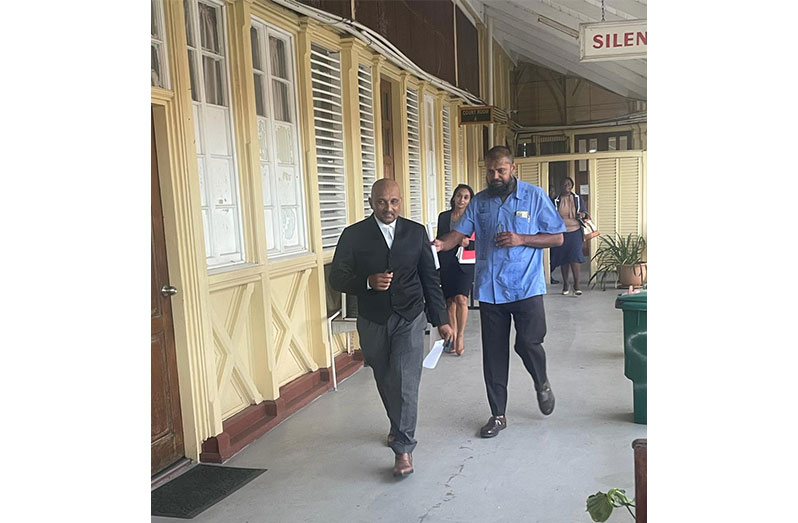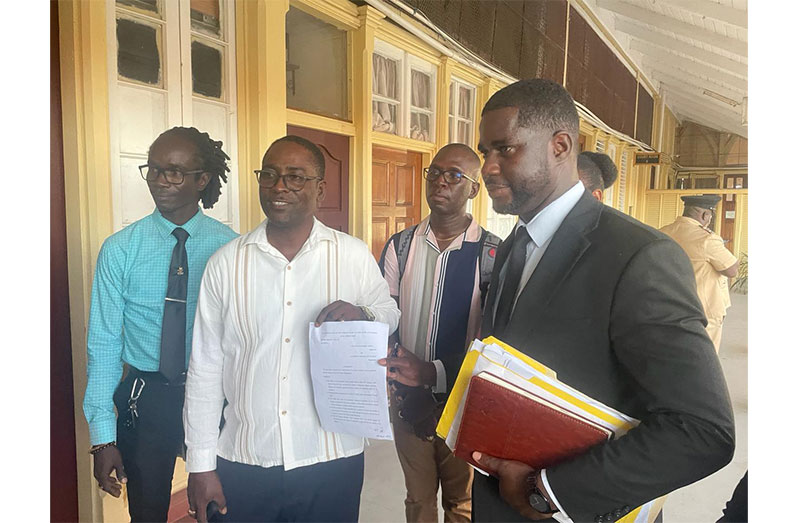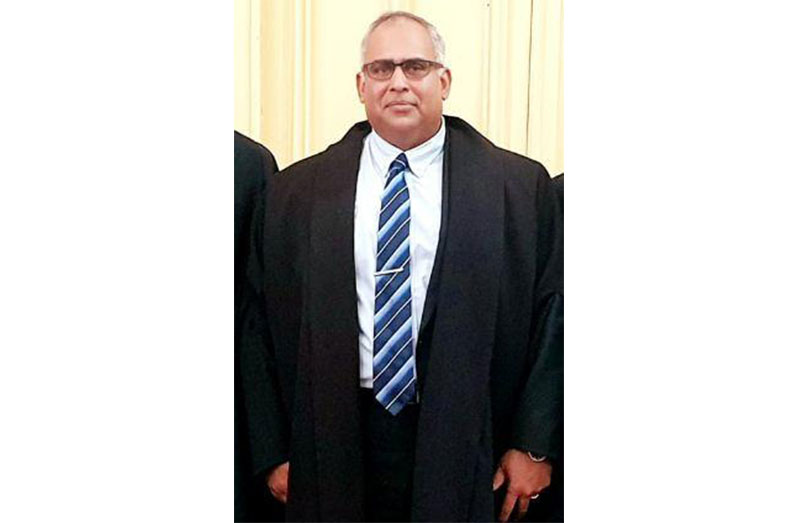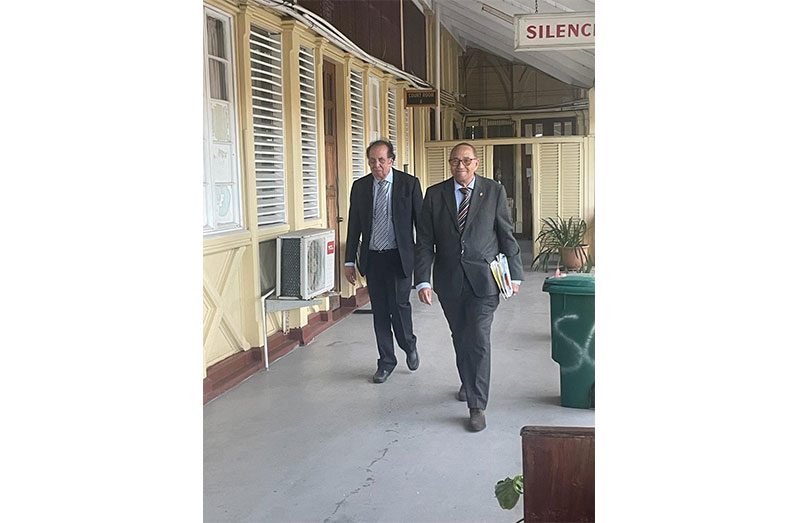–to head back to the table for talks with gov’t
–all teachers expected back in classrooms by tomorrow
By Feona Morrison
AS the government and the Guyana Teachers’ Union (GTU) have promised to continue talks on issues impacting educators, especially financial matters, striking teachers are anticipated to return to the classroom by tomorrow.
Minutes after leaving a Demerara High Court courtroom after an entire day of court-ordered mediation talks, representatives of the two sides delivered the positive news on Monday at around 18:00 hours.
The conditions of resumption, as outlined in a court-issued agreement, stipulate that teachers, “shall in good faith” resume work on or before March 6, and that talks between the Ministry of Education (MoE) and GTU must start within 48 hours after work resumes.
As per the agreement, discussions between the government and GTU will focus on matters that both parties deem appropriate for discussion, including financial affairs.

The agreement states that talks must be held at the ministry’s boardroom at Lot 26 Brickdam, Georgetown, and last for “a reasonable time”.
Justice Sandil Kissoon ordered the mediation last Thursday, and appointed two Senior Counsel Edward Luckhoo and Robin Stoby as the mediators.
Darshan Ramdhani, KC, speaking on behalf of the government, told reporters that “good sense has prevailed” in this mediation process.
He explained that the government has always been willing to work with the GTU, and would do so, going forward, for the benefit of the nation’s children, educators, and the good governance of the country.
While noting that this will take a “conciliatory approach”, Ramdhani said: “Either side will have the opportunity of presenting on, putting forward matters that they want to engage on and discuss…”
He noted that the agreement was negotiated during a “critical” period, when learners are getting ready for the Caribbean Advanced Proficiency Examination (CAPE), the National Grade Six Assessment (NGSA), and the Caribbean Secondary Education Certificate (CSEC) examinations.
GTU President Mark Lyte confirmed that the strike action has been called off, and that teachers have received assurances that their concerns will be addressed.
GTU’s attorney Darren Wade stated that the union is still “optimistic” that the government will “act in good faith”, and that it must abide by the agreement.
“So, the government cannot back out of this agreement,” Wade said.
Moreover, the agreement states: “The government represents that it continues to assure and reiterate its position that it will continue to act in good faith and in accordance with the laws of Guyana in relation to all matters under discussion.”
It further states: “The Guyana Teachers’ Union represents that it has always engaged the government and will continue to negotiate in good faith for the welfare of the teachers.”

In addition to wages and salaries, the GTU’s proposal addresses housing for teachers and increases in duty-free concessions. Both parties reserve all their rights pursuant to any agreement or the laws of Guyana, the agreement further states.
Earlier this month, as it had promised, the GTU challenged, in the High Court, the planned deductions from teachers’ pay for their participation in the industrial
action.
The government’s decision to no longer deduct dues from teachers’ wages and salaries and to remit them to the union is also being challenged.
Justice Kissoon is yet to hear arguments in this case. He has scheduled a hearing for March 20, and has pledged to make a decision as soon as possible.
Apart from a number of declarations, the GTU is requesting that the court award costs, exemplary and aggravated damages, and any additional orders the court considers just in addition to overturning the government’s decisions.
A conservatory order prohibiting the government from withholding wages until the substantive matter is heard has been issued by Justice Kissoon. The government is mandated to keep deducting union dues by another conservatory order. These are temporary orders.
Judge Kissoon had stated that the mediation would not impact the substantive case.
‘FRIVOLOUS’
Meanwhile, Attorney-General Anil Nandlall, SC, at a recent court hearing, relied on the no work, no pay principle to support the government’s plans to take money out of educators’ pay cheques.
Nandlall reasoned that the government, as an employer, is legally able to deduct money out of employees’ salaries in situations where labour is not provided.
In order for “the strikers as well as the employees [sic] to have a clear understanding of what their powers are, what their duties are, what their responsibilities are and what the law is on all these industrial issues,” he stated that he believes that this particular case would clarify the law moving ahead.
He is also confident that the GTU’s case will be thrown out because it is frivolous.

Teachers began striking on February 5, according to the GTU, because the government would not meet with the union on several issues, including the negotiation of wages, salaries, allowances, and better working conditions for teachers.
This is despite the fact that the Ministry of Education has satisfied more than half of the 41 proposals made by the GTU for better working conditions in just three years.
Government officials have also challenged the union’s claims by highlighting that discussions are ongoing to satisfy the other requests. Since the requirements for conducting a strike have not been satisfied, the government has already declared that the strike action is unlawful.
Approximately $2 billion collected from teachers by the GTU is unaccounted for, given the fact that the books of the union have not been audited by the Auditor General’s office over the last 35 years.
The Deeds and Commercial Registries Authority has revealed that the GTU last filed its financial returns 20 years ago. While alluding to these, Nandlall made it clear that the GTU’s conduct constitutes a criminal offence in respect of every one of its executives.
He said the union has been unable to account for the funds or provide a public explanation for the non-filing of its yearly returns. As such, he asked questioned on what basis should the government continued deducting dues from teachers’ salaries and remitting them to the union.
Chief Education Officer (CEO), Saddam Hussain had informed officials in each of the 11 school districts that striking teachers’ absence from the classroom must be recorded prior to the strike being cancelled. Late last month, the Attorney General had expressed optimism that the industrial aspect of the dispute will be settled.
Prior to the mediation, the GTU was demanding a formal invitation to meet with the government so that the government can present its counterproposal to a multi-year agreement the union had suggested in 2020, before the strike is called off.





.jpg)








